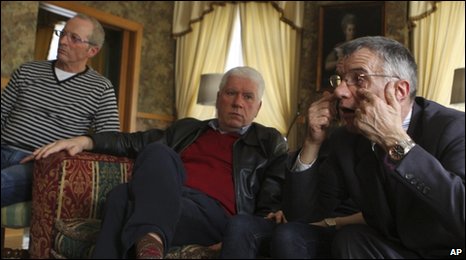
The Vatican has been accused of failing to act quickly enough against abusers
|
A leading Vatican cardinal has called for "housecleaning" as paedophile priest scandals from Italy to Ireland pile pressure on Pope Benedict. Walter Kasper, who heads the Catholic Church's ecumenical council, said the needs of victims should come first. Defending the Pope, he told an Italian newspaper the Church needed a "culture of alertness and bravery". Meanwhile suggestions that Ireland's Catholic leader will be forced to quit have been rejected by his spokesman. Cardinal Sean Brady has apologised for his role in the handling of sex abuse cases, saying he wants to work towards a just resolution of a case being taken against him by a man who alleges he was abused by a priest. There have been calls for the cardinal's resignation since it emerged he was present at two meetings in the 1970s when victims of Fr Brendan Smyth were sworn to silence about their ordeal. Information provided by the victims was not passed on to police and Smyth went on to abuse many more children before finally being convicted, in both Northern Ireland and the Irish Republic, of nearly 150 sex attacks on children. 'No turning back'
In his interview for daily Corriere della Sera, Cardinal Kasper said Pope Benedict had been the "first to feel the need for new and stricter rules". As head of the Vatican watchdog, the Congregation for the Doctrine of the Faith (CDF), the then Cardinal Joseph Ratzinger took action which led to a flood of cases of alleged sexual abuse by priests being processed. "We need a culture of alertness and bravery, to do the housework," Cardinal Kasper said. "There is no turning back on the path we are now on and that is good." The Italian interview with the cardinal appeared on Saturday morning, hours after three deaf men, who say they were repeatedly sexually abused by priests as children in northern Italy, confronted a Church spokesman on prime-time TV. The three former pupils of a Verona school for the deaf asked why their alleged abusers had not been punished and demanded justice.

The three alleged Verona victims talked to AP before going on TV
They did not go to the police because of the expiry of a 10-year statute of limitations. They have asked the priests they accuse to waive the statute so a case can be opened but to date none have done so. The spokesman for the Verona diocese, Fr Bruno Fasani, said he hoped Friday's confrontation had been constructive, but the three men refused to shake his hand. Last month, the CDF ordered Verona's bishop, Monsignor Giuseppe Zenti, to interview former pupils of the school to determine if any action should be taken against priests. The Verona case has echoes of one in the US state of Wisconsin where the CDF, which was then under Cardinal Ratzinger, told bishops in 1998 to shut down the Church trial of an elderly priest who allegedly molested 200 deaf boys at a school. Speaking to the BBC this week, one of the alleged Wisconsin victims asked why the man who is now Pope Benedict had not acted against their alleged abuser. The Vatican newspaper L'Osservatore Romano has denied there was a cover-up and denounced what it described as "an ignoble attempt to strike at Pope Benedict and his closest aides at any cost".
|

~RS~q~RS~~RS~z~RS~10~RS~)






Bookmark with:
What are these?